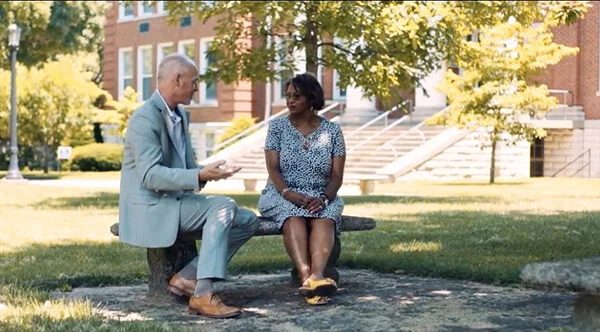At Elder Law Guidance, we help families with guardianship and conservatorship cases.
When an adult in your family can no longer manage personal care, health decisions, or finances safely, Kentucky law allows the court to appoint a guardian or conservator to protect their well-being.
Many of our cases begin after a hospitalization at Baptist Health Richmond or following a diagnosis of Alzheimer’s disease, dementia, or cognitive decline.
Founded in 2015, our firm combines elder law experience with local roots. Clients describe our approach as “patient, clear, and comforting during one of the hardest decisions a family can make.”
Understanding Guardianship and Conservatorship in Kentucky
Guardianship and conservatorship are legal protections that allow a trusted person to make decisions for an adult who can no longer manage personal or financial matters safely.
In Kentucky, these cases are filed in the District Court of the county where the individual resides or is physically located, in this case, the Madison County District Court, Probate Division, located in downtown Richmond.
Guardianship
A guardian is appointed to make decisions about a person’s health, safety, and daily care. This may include medical treatment, housing, or support services.
Kentucky allows full or limited guardianship, meaning the court can tailor authority to match what the person still can and cannot do.
For example, someone with mild dementia might retain some independence while a guardian manages healthcare or living arrangements.
Conservatorship
A conservator handles financial and property matters, such as paying bills, managing accounts, or selling assets if needed.
Conservators are often required to post a bond and must file annual reports with the court to maintain transparency.
Our Conservatorship and Guardianship Services in Madison County
- Adult Guardianship
- Minor Guardianship
- Emergency Guardianship
- Guardianship Modification or Termination
- Guardian Compliance and Reporting
- Asset Management and Accounting
- Bonding and Fiduciary Compliance
- Termination or Transition of Conservatorship
- Special Needs Trusts
- Court Representation

Get Trusted Legal Support Today
For straightforward legal advice and representation, contact Elder Law Guidance. Call (859) 544-6012 to schedule your consultation.
Why Choose Elder Law Guidance
Families in Richmond choose our firm for guardianship and conservatorship cases because we combine legal experience with compassion, education, and local insight. Our goal is to make a difficult process easier, not harder.
Strong Roots in Service and Community
Founded in 2015, our firm is built on a foundation of military service, ministry, and community work. These values guide how we serve clients, with honesty, patience, and respect for every person involved.
Experience That Understands Families
We have helped many Madison County families secure guardianship or conservatorship for parents, spouses, and adult children with special needs.
Clients often tell us we “calmed all fears” and “made the process clear and manageable” when they felt overwhelmed.
Compassionate, Trauma-Aware Guidance
Guardianship often follows a medical crisis, such as dementia or sudden cognitive decline. Our team approaches every case with empathy and awareness, allowing families time to process emotions while making sure urgent steps are handled without delay.
Education and Empowerment
Through free monthly webinars and one-on-one consultations, we teach families how Kentucky’s guardianship laws work, what rights the individual retains, and how to remain compliant with court reporting requirements.
Local Knowledge that Matters
We work daily with the Madison County District Court, Probate Division, and understand the preferences and procedures of the court. This local experience makes sure filings are accurate, complete, and handled efficiently.
Our No-Pressure Promise
We never push unnecessary services. Our goal is to protect your loved one, your family’s peace of mind, and your financial security.
When Guardianship or Conservatorship Becomes Necessary in Richmond
Guardianship or conservatorship becomes necessary when an adult can no longer manage personal, medical, or financial affairs safely due to conditions like dementia, illness, or incapacity, and no less restrictive alternative can protect their well-being.
The court determines incapacity based on medical and psychological evaluations. These often follow a serious health event or diagnosis like Alzheimer’s disease or another form of dementia.
Anyone may initiate the petition when safety or financial exploitation becomes a concern.
The judge reviews medical evidence, hears testimony from family and professionals, and decides to appoint a guardian or conservator, and if the appointment should be full or limited.
Kentucky law emphasizes least-restrictive alternatives, meaning the court grants only as much authority as necessary to protect the individual. Guardians and conservators must report regularly to the court to provide ongoing oversight and accountability.
About Our Firm: Your Trusted Partners
Founded by Attorney Scott Collins, our firm brings together professionals with backgrounds in law, military service, ministry, and community leadership, offering both legal experience and a deep understanding of the people we serve.
Since 2015, we’ve helped Kentucky families protect what matters most through careful planning, personalized guidance, and dedicated advocacy. Our team combines technical precision with genuine care, making sure every client feels informed and supported at every step.
We believe in an education-first approach, offering free consultations and live webinars to help clients understand their options and make confident decisions about their future.
At our core, we’re committed to delivering trusted counsel, practical solutions, and lasting peace of mind for every family and individual we represent.
Our Guardianship and Conservatorship Process
Step 1: Free Consultation
We begin with a free consultation at our A.R. Burnam House office in Richmond or virtually. During this meeting, we review your situation, explain Kentucky’s guardianship standards, and identify next steps.
Step 2: Petition and Evaluation
We prepare and file the guardianship or conservatorship petitions with the Madison County District Court. Kentucky law requires three evaluations: one from a physician, one from a licensed psychologist, and one from a social worker.
This is called the “interdisciplinary team” or simply, IDT. All IDT members must evaluate the person alleged to be incapacitated and issue a report on the individual’s level of incapacity and any recommendations on guardianship/conservatorship.
Step 3: Hearing Before the Court
A judge reviews testimony, medical evidence, and professional reports to determine incapacity and appoints the guardian or conservator or both, if necessary. All reports from
Step 4: Bond and Letters of Guardianship
Once appointed, the guardian and/or conservator may need to post a bond before the court issues an order confirming authority.
Step 5: Reporting and Oversight
Kentucky requires ongoing court supervision. Guardians must submit annual personal status reports, while conservators must provide detailed annual accountings of income and assets to the District Court. Our team assists clients with these filings to confirm compliance and continued transparency.
Local Resources We Work With in Madison County
- Madison County District Court
- Madison County Clerk’s Office
- Baptist Health Richmond
- Richmond Senior Citizens Center
- Kenwood Health & Rehabilitation Center
- Council for Elder Maltreatment Prevention (CEMP)
Ready to Protect Your Loved One Through Guardianship or Conservatorship?
Schedule your free consultation this week at our welcoming office in Richmond.
Peace of mind starts with one conversation.




